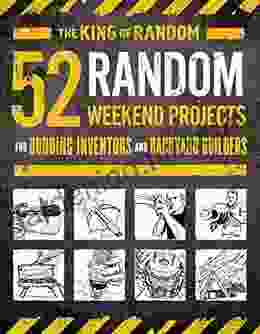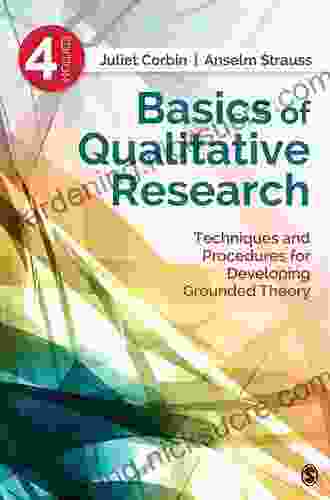Delving into the Basics of Qualitative Research: A Comprehensive Guide

Qualitative research is a type of research that seeks to understand and interpret the meaning of people's experiences, thoughts, and behaviors. It is based on the idea that reality is socially constructed and that the researcher's own experiences and interpretations play a role in the research process.
Qualitative research is often used in the social sciences, such as sociology, anthropology, and psychology. It can be used to study a wide range of topics, such as the experiences of marginalized groups, the effects of social policy, and the ways in which people make sense of their world.
4.7 out of 5
| Language | : | English |
| File size | : | 4183 KB |
| Text-to-Speech | : | Enabled |
| Enhanced typesetting | : | Enabled |
| Word Wise | : | Enabled |
| Print length | : | 454 pages |
Types of Qualitative Research
There are many different types of qualitative research, each with its own strengths and weaknesses. Some of the most common types of qualitative research include:
- Interviews: Interviews are one-on-one conversations between the researcher and a participant. They can be structured, semi-structured, or unstructured.
- Focus groups: Focus groups are group discussions that are led by a researcher. They can be used to explore a wide range of topics and to generate new ideas.
- Participant observation: Participant observation involves the researcher observing people in their natural setting. This can be done in a variety of settings, such as schools, workplaces, or community centers.
- Ethnography: Ethnography is a type of qualitative research that involves the researcher immersing themselves in a culture or community. This can involve living with the people being studied and participating in their daily lives.
- Case studies: Case studies are in-depth studies of a particular individual, group, or event. They can be used to explore complex issues and to generate new insights.
The Qualitative Research Process
The qualitative research process typically involves the following steps:
- Defining the research question: The first step is to define the research question that you want to answer. This question should be specific, focused, and manageable.
- Selecting a research method: Once you have defined your research question, you need to select a research method that will allow you to answer it. The type of research method that you choose will depend on the nature of your research question and the resources that you have available.
- Collecting data: The next step is to collect data. This can involve conducting interviews, focus groups, participant observation, or other methods.
- Analyzing data: Once you have collected data, you need to analyze it. This involves identifying themes, patterns, and insights in the data.
- Interpreting data: The final step is to interpret the data. This involves making sense of the themes, patterns, and insights that you have identified and drawing s from them.
Strengths and Weaknesses of Qualitative Research
Qualitative research has a number of strengths, including:
- It is flexible: Qualitative research can be adapted to a wide range of topics and research questions.
- It is in-depth: Qualitative research allows researchers to explore complex issues in depth.
- It is naturalistic: Qualitative research can be conducted in natural settings, which allows researchers to observe people in their everyday lives.
However, qualitative research also has a number of weaknesses, including:
- It is time-consuming: Qualitative research can be time-consuming to conduct and analyze.
- It is subjective: Qualitative research is based on the researcher's own experiences and interpretations, which can make it difficult to generalize the findings to a wider population.
- It is difficult to replicate: Qualitative research is often difficult to replicate, which can make it difficult to build on the findings of other studies.
Qualitative research is a powerful tool for understanding the meaning of people's experiences, thoughts, and behaviors. It can be used to study a wide range of topics and to generate new insights into the human condition. However, it is important to be aware of the strengths and weaknesses of qualitative research before using it in your own research.
4.7 out of 5
| Language | : | English |
| File size | : | 4183 KB |
| Text-to-Speech | : | Enabled |
| Enhanced typesetting | : | Enabled |
| Word Wise | : | Enabled |
| Print length | : | 454 pages |
Do you want to contribute by writing guest posts on this blog?
Please contact us and send us a resume of previous articles that you have written.
 Fiction
Fiction Non Fiction
Non Fiction Romance
Romance Mystery
Mystery Thriller
Thriller SciFi
SciFi Fantasy
Fantasy Horror
Horror Biography
Biography Selfhelp
Selfhelp Business
Business History
History Classics
Classics Poetry
Poetry Childrens
Childrens Young Adult
Young Adult Educational
Educational Cooking
Cooking Travel
Travel Lifestyle
Lifestyle Spirituality
Spirituality Health
Health Fitness
Fitness Technology
Technology Science
Science Arts
Arts Crafts
Crafts DIY
DIY Gardening
Gardening Petcare
Petcare Martha Menchaca
Martha Menchaca Jozef Nauta
Jozef Nauta Mark Hatmaker
Mark Hatmaker Yan Shen
Yan Shen Jonathan Ross
Jonathan Ross Aly Madhavji
Aly Madhavji Tok Hui Yeap Rd Csp Ld
Tok Hui Yeap Rd Csp Ld Caroline Porter Thomas
Caroline Porter Thomas Eric Haseltine
Eric Haseltine Charles Seife
Charles Seife Marisha Pessl
Marisha Pessl Tami Lynn Kent
Tami Lynn Kent Harry Middleton
Harry Middleton Lucas Whitecotton
Lucas Whitecotton Nancy Keene
Nancy Keene Robert A Johnson
Robert A Johnson Tracy Gharbo
Tracy Gharbo James Mcnicholas
James Mcnicholas Theresa Cheung
Theresa Cheung Patrick Viafore
Patrick Viafore Michael Alvear
Michael Alvear Jean Clottes
Jean Clottes Patrick E Mcgovern
Patrick E Mcgovern Chris Stewart
Chris Stewart John Kreiter
John Kreiter A Digger Stolz
A Digger Stolz Sheryl Crow
Sheryl Crow Seymour Simon
Seymour Simon 4th Edition Kindle Edition With Audio Video
4th Edition Kindle Edition With Audio Video Peter Wohlleben
Peter Wohlleben Jim Burns
Jim Burns Natalie Smith
Natalie Smith Susan Walker
Susan Walker Lee Smolin
Lee Smolin Roger Gordon
Roger Gordon Oscar Wegner
Oscar Wegner Christopher Mcdougall
Christopher Mcdougall Geri Ann Galanti
Geri Ann Galanti Eva Feder Kittay
Eva Feder Kittay Kyla Stone
Kyla Stone Alec Crawford
Alec Crawford Raymond H Thompson
Raymond H Thompson Richard Adams
Richard Adams John Collins
John Collins Jasper Godwin Ridley
Jasper Godwin Ridley 3rd Ed Edition Kindle Edition
3rd Ed Edition Kindle Edition Joe Cuhaj
Joe Cuhaj A R Bernard
A R Bernard Janet Sasson Edgette
Janet Sasson Edgette Eloise Jarvis Mcgraw
Eloise Jarvis Mcgraw Evan Brashier
Evan Brashier Bob Welch
Bob Welch A C Grayling
A C Grayling Dinokids Press
Dinokids Press Naomi Scott
Naomi Scott Greg Midland
Greg Midland Richard Ania
Richard Ania Syougo Kinugasa
Syougo Kinugasa Amy Chua
Amy Chua Freda Mcmanus
Freda Mcmanus Tasha Dunn
Tasha Dunn Ricki E Kantrowitz
Ricki E Kantrowitz Sherry Monahan
Sherry Monahan Debra Pascali Bonaro
Debra Pascali Bonaro Jeff Gill
Jeff Gill William Regal
William Regal Louis Stanislaw
Louis Stanislaw Stefan Hofer
Stefan Hofer P G Maxwell Stuart
P G Maxwell Stuart Dan Wingreen
Dan Wingreen Rick Gurnsey
Rick Gurnsey Edyta Roszko
Edyta Roszko Rashad Jennings
Rashad Jennings Pamela Adams
Pamela Adams G I Gurdjieff
G I Gurdjieff Steven D Levitt
Steven D Levitt Tony Hernandez Pumarejo
Tony Hernandez Pumarejo David Lloyd Kilmer
David Lloyd Kilmer Joe Chilson
Joe Chilson Kristen Riecke
Kristen Riecke Nadav Snir
Nadav Snir Maureen Johnson
Maureen Johnson L Ulloque
L Ulloque Vibrant Publishers
Vibrant Publishers E Bruce Goldstein
E Bruce Goldstein Ernest Shackleton
Ernest Shackleton Andy Charalambous
Andy Charalambous Robert Thurston
Robert Thurston Bruce Watson
Bruce Watson 006 Edition Kindle Edition
006 Edition Kindle Edition Jack M Bloom
Jack M Bloom Eric I Karchmer
Eric I Karchmer Tim R Wolf
Tim R Wolf Al Ford
Al Ford Michael S Gazzaniga
Michael S Gazzaniga 6th Edition Kindle Edition
6th Edition Kindle Edition 1st English Ed Edition Kindle Edition
1st English Ed Edition Kindle Edition Nathalie Dupree
Nathalie Dupree Bookrags Com
Bookrags Com Clint Malarchuk
Clint Malarchuk Chris Lehto
Chris Lehto Steve Magness
Steve Magness Edward Rosenfeld
Edward Rosenfeld Marie Louise Von Franz
Marie Louise Von Franz Kevin Paul
Kevin Paul Susan E Cayleff
Susan E Cayleff Dr Brenda Stratton
Dr Brenda Stratton Jason Miller
Jason Miller Grant Thompson
Grant Thompson Iris Bohnet
Iris Bohnet 50minutes Com
50minutes Com Jacqueeia Ferguson
Jacqueeia Ferguson Margaret Littman
Margaret Littman Eli Boschetto
Eli Boschetto Greta Solomon
Greta Solomon Michaela Stith
Michaela Stith Muata Ashby
Muata Ashby Claudio De Castro
Claudio De Castro Diamond Wilson
Diamond Wilson Joseph E Garland
Joseph E Garland Bree Moore
Bree Moore Jordan Ifueko
Jordan Ifueko Olszewski Marie Erin
Olszewski Marie Erin Rowan Ricardo Phillips
Rowan Ricardo Phillips Howard Mudd
Howard Mudd Sadie Radinsky
Sadie Radinsky Monte Burch
Monte Burch Jamie Hand
Jamie Hand Gregory Collins
Gregory Collins Robert Bauval
Robert Bauval John Coleman
John Coleman Fata Ariu Levi
Fata Ariu Levi Edward Frenkel
Edward Frenkel Terrence Real
Terrence Real Manuel De La Cruz
Manuel De La Cruz Barnett Rich
Barnett Rich Joseph Chilton Pearce
Joseph Chilton Pearce Icon Digital Publishing
Icon Digital Publishing Dalai Lama
Dalai Lama Jason Curtis
Jason Curtis Bernard Cornwell
Bernard Cornwell Dervla Murphy
Dervla Murphy Dustyn Roberts
Dustyn Roberts Steve Garnett
Steve Garnett Gail Craswell
Gail Craswell Leonardo Trasande
Leonardo Trasande Dave Gerr
Dave Gerr Leigh Calvez
Leigh Calvez Paul Martin
Paul Martin Jeremy Desilva
Jeremy Desilva Katie J Trent
Katie J Trent Z Justin Ren
Z Justin Ren A Christine Harris
A Christine Harris Robert Pondiscio
Robert Pondiscio Gianni La Forza
Gianni La Forza Daphne Adler
Daphne Adler Bertolt Brecht
Bertolt Brecht George W E Nickelsburg
George W E Nickelsburg Lj Rivers
Lj Rivers Ellen Levitt
Ellen Levitt Kennedy Achille
Kennedy Achille Donna M Mertens
Donna M Mertens Tony Horton
Tony Horton Tom Mchale
Tom Mchale Nikki Grimes
Nikki Grimes Patricia Moore Pastides
Patricia Moore Pastides Neal Bascomb
Neal Bascomb Melissa Cheyney
Melissa Cheyney 7th Edition Kindle Edition
7th Edition Kindle Edition Jillian Dodd
Jillian Dodd Bonnie Scott
Bonnie Scott Mimi Lemay
Mimi Lemay Emily A Duncan
Emily A Duncan Whit Honea
Whit Honea Peter Dewhurst
Peter Dewhurst Glenn N Levine
Glenn N Levine Wong Kiew Kit
Wong Kiew Kit Linda A Roussel
Linda A Roussel Subsequent Edition Kindle Edition
Subsequent Edition Kindle Edition Elizabeth Wenk
Elizabeth Wenk Stephen P Anderson
Stephen P Anderson Deanne Howell
Deanne Howell 5th Edition Kindle Edition
5th Edition Kindle Edition Bill Reif
Bill Reif L Madison
L Madison Laurie Forest
Laurie Forest Geoffrey West
Geoffrey West Brennan Barnard
Brennan Barnard Allan Mundsack
Allan Mundsack A C Davison
A C Davison Jay Wilkinson
Jay Wilkinson Jacquetta Hawkes
Jacquetta Hawkes William A Dembski
William A Dembski Christy Jordan
Christy Jordan Betty Crocker
Betty Crocker Jamaica Stevens
Jamaica Stevens Elizabeth D Hutchison
Elizabeth D Hutchison Gregory J Privitera
Gregory J Privitera Emma Dalton
Emma Dalton Gina Rae La Cerva
Gina Rae La Cerva Brooklyn James
Brooklyn James Nathan Jendrick
Nathan Jendrick Mark V Wiley
Mark V Wiley Thomas R Baechle
Thomas R Baechle Micah Goodman
Micah Goodman Mark Brazil
Mark Brazil Lewis Henry Morgan
Lewis Henry Morgan Oliver Theobald
Oliver Theobald Heather Rain Mazen Korbmacher
Heather Rain Mazen Korbmacher Kerri Maniscalco
Kerri Maniscalco Elizabeth Sims
Elizabeth Sims John Iceland
John Iceland Tyler Vanderweele
Tyler Vanderweele Cynthia Bourgeault
Cynthia Bourgeault David Kushner
David Kushner Andrew Maraniss
Andrew Maraniss Don Fink
Don Fink Debra Barnes
Debra Barnes Peter Cossins
Peter Cossins Andrew Shapland
Andrew Shapland Nick Winkelman
Nick Winkelman Jay Cassell
Jay Cassell Robert Peter Gale
Robert Peter Gale Leonard Pellman
Leonard Pellman Natasha Preston
Natasha Preston Cassandra Johnson
Cassandra Johnson Justin Bower
Justin Bower Lareina Rule
Lareina Rule Mei Fong
Mei Fong Rifujin Na Magonote
Rifujin Na Magonote Brian Thompson
Brian Thompson Hong Chen
Hong Chen Leon Anderson
Leon Anderson James D Long
James D Long Stewart Smith
Stewart Smith Lin Pardey
Lin Pardey 8th Edition Kindle Edition
8th Edition Kindle Edition David Beaupre
David Beaupre Brian Kent
Brian Kent George Pendle
George Pendle Josh Mulvihill
Josh Mulvihill Sam Goulden
Sam Goulden Lars Behnke
Lars Behnke Andrew Collins
Andrew Collins Robert Ferguson
Robert Ferguson Louis Liebenberg
Louis Liebenberg Carl J Sindermann
Carl J Sindermann Ben Egginton
Ben Egginton James Diego Vigil
James Diego Vigil Bernard Rosner
Bernard Rosner Liesbet Collaert
Liesbet Collaert Dan Falk
Dan Falk 50minutos Es
50minutos Es Robert K Tyson
Robert K Tyson Anthony Arvanitakis
Anthony Arvanitakis Jo Frost
Jo Frost Paul Deepan
Paul Deepan Chris Froome
Chris Froome Richard Bromfield
Richard Bromfield Mauricio Cabrini
Mauricio Cabrini Simon G Thompson
Simon G Thompson Martin Mobraten
Martin Mobraten Amy Ogle
Amy Ogle Mike Tyson
Mike Tyson Frank Sargeant
Frank Sargeant Suzie Cooney
Suzie Cooney John Hands
John Hands Janetti Marotta
Janetti Marotta John Green
John Green Karl Morris
Karl Morris Nnedi Okorafor
Nnedi Okorafor Mohamed Elgendy
Mohamed Elgendy J D Salinger
J D Salinger Garrett Grolemund
Garrett Grolemund Brenda Dehaan
Brenda Dehaan Kristine Setting Clark
Kristine Setting Clark Temple Grandin
Temple Grandin Ziemowit Wojciechowski
Ziemowit Wojciechowski Michael W Ford
Michael W Ford Theris A Touhy
Theris A Touhy Patricia Stevens
Patricia Stevens Heather Job
Heather Job Prerna Lal
Prerna Lal Ellen Sue Turner
Ellen Sue Turner Patricia S Potter Efron
Patricia S Potter Efron Miko Flohr
Miko Flohr Tom Lyons
Tom Lyons Jasmine Greene
Jasmine Greene Meik Wiking
Meik Wiking 2005th Edition Kindle Edition
2005th Edition Kindle Edition Carol Stock Kranowitz
Carol Stock Kranowitz Keith Siragusa
Keith Siragusa Christa Orecchio
Christa Orecchio Katie M John
Katie M John Josh Elster
Josh Elster Kerry Fraser
Kerry Fraser Theodore X O Connell
Theodore X O Connell Marty Bartholomew
Marty Bartholomew Terence N D Altroy
Terence N D Altroy Mary H K Choi
Mary H K Choi Bruno Latour
Bruno Latour Alessa Ellefson
Alessa Ellefson Mark Gregston
Mark Gregston Elaine Beaumont
Elaine Beaumont Tom Pyszczynski
Tom Pyszczynski Sam Irwin
Sam Irwin Kekla Magoon
Kekla Magoon Breanna Lam
Breanna Lam Naomi Feil
Naomi Feil Miranda Castro
Miranda Castro John A Yoegel
John A Yoegel Starley Talbott
Starley Talbott Chris Dietzel
Chris Dietzel Collins Gcse
Collins Gcse Kristi K Hoffman
Kristi K Hoffman Deepak Chopra
Deepak Chopra Chase Williams
Chase Williams Duy Tran
Duy Tran Claire Sierra
Claire Sierra Justine Brooks Froelker
Justine Brooks Froelker Christoph Delp
Christoph Delp Shonna Slayton
Shonna Slayton Robert Venditti
Robert Venditti Andrea Wulf
Andrea Wulf Barbara Klein
Barbara Klein Michael Geheran
Michael Geheran 3rd Edition Kindle Edition
3rd Edition Kindle Edition Patricia O Quinn
Patricia O Quinn Porter Fox
Porter Fox 1st Edition Kindle Edition
1st Edition Kindle Edition Marcia Verduin
Marcia Verduin Monica Sorrenson
Monica Sorrenson Steve Kantner
Steve Kantner Dominik Hartmann
Dominik Hartmann Sloane Mcclain
Sloane Mcclain Bobby Blair
Bobby Blair 2nd Edition Kindle Edition
2nd Edition Kindle Edition Joe Oliver
Joe Oliver Alden Jones
Alden Jones Lois Duncan
Lois Duncan Heather Demetrios
Heather Demetrios Gregory A Boyd
Gregory A Boyd Patrick Lange
Patrick Lange Jessica Shortall
Jessica Shortall Andre Norton
Andre Norton Roselyn Teukolsky
Roselyn Teukolsky Robert S Mueller
Robert S Mueller Jiichi Watanabe
Jiichi Watanabe Kelly Skeen
Kelly Skeen Jong Chul Ye
Jong Chul Ye Paul Johnson
Paul Johnson Russell Miller
Russell Miller Raymond Buckland
Raymond Buckland John Gribbin
John Gribbin J Michael Leger
J Michael Leger Gayle Jervis
Gayle Jervis Skye Genaro
Skye Genaro Christopher Lakeman
Christopher Lakeman Kenny Casanova
Kenny Casanova Manhattan Prep
Manhattan Prep Andrew Weber
Andrew Weber Herbert Feigl
Herbert Feigl Aubrey Clayton
Aubrey Clayton Erika Bornman
Erika Bornman J Morgan Mcgrady
J Morgan Mcgrady Sandra Mizumoto Posey
Sandra Mizumoto Posey Dan Blackburn
Dan Blackburn Karen Myers
Karen Myers Cindy Kennedy
Cindy Kennedy Dr Katayune Kaeni
Dr Katayune Kaeni Michael Romano
Michael Romano Samantha Lovely
Samantha Lovely Max Domi
Max Domi L S Boos
L S Boos Filipe Masetti Leite
Filipe Masetti Leite Justin Hammond
Justin Hammond Billie Jean King
Billie Jean King Riddleland
Riddleland Michael Clarke
Michael Clarke David Simkins
David Simkins Alan Jacobs
Alan Jacobs Bryan Smith
Bryan Smith Apsley Cherry Garrard
Apsley Cherry Garrard Nate G Hilger
Nate G Hilger 1st Ed 2016 Edition Kindle Edition
1st Ed 2016 Edition Kindle Edition Patrick Hunt
Patrick Hunt Justin Doyle
Justin Doyle Gershon Ben Keren
Gershon Ben Keren John Gookin
John Gookin Sarah Templeton
Sarah Templeton Jd Brown
Jd Brown Mitch Rubman
Mitch Rubman Elizabeth Bradfield
Elizabeth Bradfield Pat Dorsey
Pat Dorsey Jon Dunn
Jon Dunn David Cheng
David Cheng Emma Lord
Emma Lord Shelby Hailstone Law
Shelby Hailstone Law Buddy Martin
Buddy Martin Robert Mcentarffer
Robert Mcentarffer Kate Usher
Kate Usher Juno Dawson
Juno Dawson Adam Silvera
Adam Silvera Laura Bright
Laura Bright Thomas Wentworth Higginson
Thomas Wentworth Higginson Jenifer Fox
Jenifer Fox Kelly Slater
Kelly Slater Kate Spencer
Kate Spencer Jeffrey A Greene
Jeffrey A Greene Claire Baker
Claire Baker Lenora Ucko
Lenora Ucko Chris I Naylor
Chris I Naylor Andrew G Marshall
Andrew G Marshall Leslie Leyland Fields
Leslie Leyland Fields Ulla Sarmiento
Ulla Sarmiento Lesli Richards
Lesli Richards Terence Grieder
Terence Grieder Dr Danny Penman
Dr Danny Penman Alice Ginott
Alice Ginott Eric Dominy
Eric Dominy 2012th Edition Kindle Edition
2012th Edition Kindle Edition Theodor W Adorno
Theodor W Adorno Diane Duane
Diane Duane 4th Edition Kindle Edition
4th Edition Kindle Edition Broccoli Lion
Broccoli Lion Gary S Thorpe
Gary S Thorpe
Light bulbAdvertise smarter! Our strategic ad space ensures maximum exposure. Reserve your spot today!

 Billy PetersonThe Ultimate Guide to the Handbook of Cubik Math by Thomas Baechle: Unlocking...
Billy PetersonThe Ultimate Guide to the Handbook of Cubik Math by Thomas Baechle: Unlocking... Robin PowellFollow ·3.2k
Robin PowellFollow ·3.2k Jacob HayesFollow ·15k
Jacob HayesFollow ·15k DeShawn PowellFollow ·10.2k
DeShawn PowellFollow ·10.2k Jeff FosterFollow ·5.1k
Jeff FosterFollow ·5.1k Zadie SmithFollow ·5k
Zadie SmithFollow ·5k Henry Wadsworth LongfellowFollow ·14.9k
Henry Wadsworth LongfellowFollow ·14.9k Fabian MitchellFollow ·4k
Fabian MitchellFollow ·4k Marc FosterFollow ·19.3k
Marc FosterFollow ·19.3k

 Finn Cox
Finn CoxA Comprehensive Guide for Budding Inventors and Backyard...
For those with a restless mind and a...

 Forrest Reed
Forrest ReedThe Ultimate Shopper's Guide to Purchasing Weight Lifting...
Are you looking...

 Dillon Hayes
Dillon HayesThe Chemical Choir: Unveiling the Enchanting Symphony of...
In the enigmatic realm of science, where...

 Ryūnosuke Akutagawa
Ryūnosuke AkutagawaStumbling Thru: Hike Your Own Hike
In the realm of outdoor adventures,...

 Terry Pratchett
Terry PratchettUnlock Your Math Skills: A Comprehensive Guide to Chenier...
Math plays a vital role in...
4.7 out of 5
| Language | : | English |
| File size | : | 4183 KB |
| Text-to-Speech | : | Enabled |
| Enhanced typesetting | : | Enabled |
| Word Wise | : | Enabled |
| Print length | : | 454 pages |











